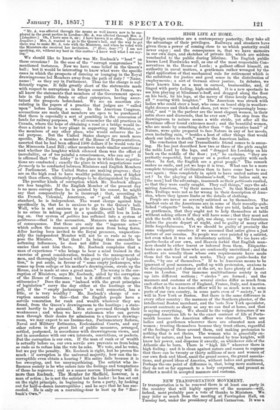HIGH LIFE AT HOME.
foreign countries are a contemporary posterity, they take all the advantage of their privileges. Railways and steamers have given them a power of coming close to us which posterity could never enjoy ; and the consequence is, that we Ihave memoirs in our own days, and sketches of private life, which are seldom vouchsafed to the public during -lifetime. The English public knows Lord Hardwicke well, as one of the most respectable Conservatives in the House of Lords ; a gallant officer himself, an authority in naval matters, a gentleman rather wronged by the rigid application of that mechanical rule for retirement which is the substitute for justice and good sense in the distribution of employments ; a sort of German silver justice. In debates, we have known him as a man in earnest, businesslike, and, if tinged with party feeling, high-minded. It is a new spectacle to see him playing at blindman's-buff, and dragged along the floor on his back, by his legs, at the mercy of three lovely daughters, all "roaring with laughter." The American was struck with ladies who could steer a boat, who came on board ship in weathertiglit dresses and thick-soled shoes, yet were " surpassingly beautiful," and "in the parlour are the most elegant women in their satin shoes and diamonds, that he ever saw. The step from the drawingroom to nature seems a wide stride, yet after all the Merrimac officer found extremes meet; and the -beautiful women, who are made by something defter than "the 'prentioe hand" of Nature, were quite prepared to face Nature in any of her moods, even including rain, " besides a host of other things that would shook our ladies to death," namely the American ladies.
The conclusion that our Transatlantic friend comes to is amusing. He has just described how two or three of the girls caught the noble Lord by the legs, and "dragged his Lordship on his back on the middle of the floor ; yet," ho exclaims, "they are perfectly respectful, but appear on a perfect equality with each other. In fact, the English are a great people." The remark makes us smile, and yet we hope it is true. What can be a more complete triumph of civilization than to have come beet to nature again ; thus completely in spirit to have united nature and art ? In the playing at blindman's-buff, "the ladies said, we [the men] had the advantage, inasmuch as their petticoats rustled, so that they were easily caught. They call things," says the admiring American, "by their names here." So that Marryat and. Mrs. Trollope were not so far wrong in their description of America, where they ignore limbs or the details of clothing. People are never so severely satirized as by themselves. The hardest cuts at the Americans are in some of their recently-published " etiquette " books, in which they are told, ladies as well as gentlemen, that they ought not to help themselves at table without asking others if they will have some ; that they must not pick the teeth with a fork, spit, use slang, cover up the furniture before the guests depart at night, and be guilty of many other little forgetfulnesses. Yet we should be guilty of precisely the same vulgarity ourselves if we assumed that satire gives a just picture of our cousins. No people was over painted by a satirist, not even when it was an involuntary satirist. We too have etiquette-books of our own, and Heaven forbid that English manners should be either learnt or inferred from them. Etiquettebooks are made for those who are confessedly uncivilized ; and the authors are usually those whose own requirements have made them feel the want of such works. They are guide-books for snobs, "by one of themselves." If to be American means to be ignorant of good manners, puffed up with pretension, anxious to be distinguished yet clumsy at the art, we have plenty of Americans in London. Our immense multitudinous society is out up into different sections ; " circles " are formed ; and the manners and customs of the several circles differ as much from each other as the manners of England, France, Italy, and America. The sketch by an American officer will be as Much news in some parts of our own country, in some parts even of " society," as it will in New York or Boston. But there is the same differenee in every other country: the manners of the Southern planter, of the intellectual Boston merchant, and the 'cute New York speculator, present contrasts as sharp as any we can find at home, and that Is saying everything. We should be the vulgar detractors if we supposed American life to be the exact contrast of life at Portsmouth because the American officer was charmed. There are ladies and gentlemen wherever there are educated men and women ; trusting themselves bemuse they trust others, regardful of the feelings of those around them, and making pretension to nothing that is not theirs. The woman who is gracefully endowed by nature, and has been surrounded by true knights, will know her power, and dispense it sweetly, on whichever side of the Atlantic she be born. There is "high life" wherever there is high feeling; and it is clean against nature and reason to suppose that there can be twenty or thirty millions of men and women of our own flesh and blood, amid the grand scenes, the grand associations and grand ideas of America, without ladies and gentlemen. Perhaps the one point of difference is, that, being more scattered, they do not so far approach to a body corporate, and present so distinct a model in accepted manners and customs.













































 Previous page
Previous page